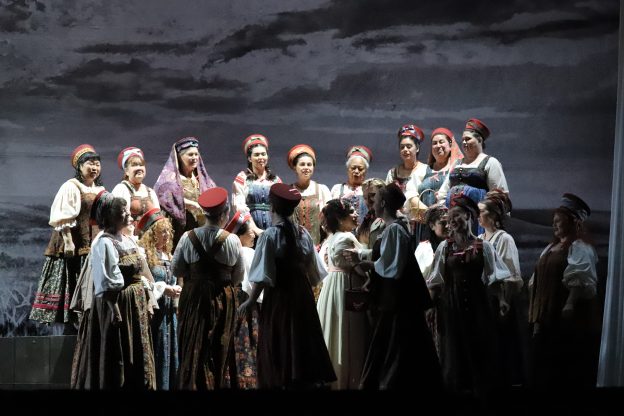
Honolulu Star-Advertiser Review – Voices soar in Hawaii Opera Theatre’s ‘Onegin’
Hawaii Opera Theatre opened its production of the enduringly popular “Eugene Onegin” to a small but enthusiastic audience Friday at Blaisdell Concert Hall.
Pushkin may have titled his classic tale “Eugene Onegin,” but Tchaikovsky composed the opera for Tatyana, a naive country girl who, rejected by the man she loves, matures to become a great woman of Russian high society. Even so, the story remains a tragedy: Onegin, with his plush but purposeless life, can’t change and creates his own misery by scorning true love and killing his best friend. By the time he realizes his mistakes, it’s too late.
At its heart, “Eugene Onegin” is a morality play, instructing while entrancing, and Tchaikovsky’s music conveys subtle, deeply felt emotions that unfold graciously, allowing the audience to live the drama moment-to-moment.
As so often with HOT productions, the evening’s highlight was the voices. As Tatyana, Melody Moore’s powerful, warm soprano set the opera’s moral compass — as soon as he heard her, Onegin should have known she would win out — and tenor Viktor Antipenko made a terrific Lensky, Onegin’s friend.
The applause for his heart-wrenching farewell-to-life aria in Act II stopped the show.
In his sole scene, tenor Timur, known by only his first name, had the audience in stitches with his Monsieur Triquet, a risibly pretentious French fop who epitomizes how Russia felt about France’s political dominance.
Bass-baritone Ryan McKinny was excellent as the painfully foolish Onegin — a tough character to love — and Katharine Goeldner’s terrific voice foregrounded her role as Tatyana’s mother. Tara Venditti made Olga, Lensky’s love, both sympathetic and appealingly vivacious, and Suzanne Hendrix delivered strong support as Tatyana’s nanny.
In most operas, the leading couple have high voices, and the secondary couple, lower. With a touch of Russian irony, Tchaikovsky mismatched his couples: the naive innocents (Tatyana and Lensky) have high voices, each paired with a lower, darker character (Eugene and Olga).
The opera is filled with colorfully nationalistic scenes, largely by HOT’s excellent “grand Russian chorus,” which serves as the plot’s “context character” representing both Russia and its people: peasants, neighbors, aristocrats, singing Russian songs, dancing Russian dances, celebrating Russian culture.
Tchaikovsky’s love for Russia is almost palpable.
Director Tomer Zvulun set the opera as a flashback, triggered by Tatyana and Onegin re-reading each other’s fateful letters and re-imagining their youth. Tellingly, whereas the elderly Tatyana embraces her youthful self, the elderly Onegin warily squares off against his.
The staging was effective throughout, and notable moments included “freeze framing” critical junctures and an extended moment of silence — rare in opera — following Tatyana’s final exit, leaving Onegin bereft.
The scenery is jointly owned by five opera companies, an increasingly common arrangement that affords larger sets. Pieces transitioned smoothly through this opera’s longer changes and incorporated clever touches: walls “opening out” into Tatyana’s and Onegin’s memories; Onegin standing behind a sheer curtain in Tatyana’s bedroom, conjured by her imagination; a half-curtain suggesting a palatial terrace.
The HOT orchestra, ably conducted by David Charles Abell, delivered a fine performance, including those treacherously delicate beginnings of preludes. In Act I, there was disconcerting phasing between orchestra and singers that took time to sort out, as though Abell expected the singers to follow the orchestra.
“Eugene Onegin” runs three hours, including two intermissions. Remember to bring a sweater; the hall is chilly.
Ruth O. Bingham received her doctorate in musicology from Cornell University and has reviewed the musical arts for more than 25 years.
For The Honolulu Star-Advertiser
